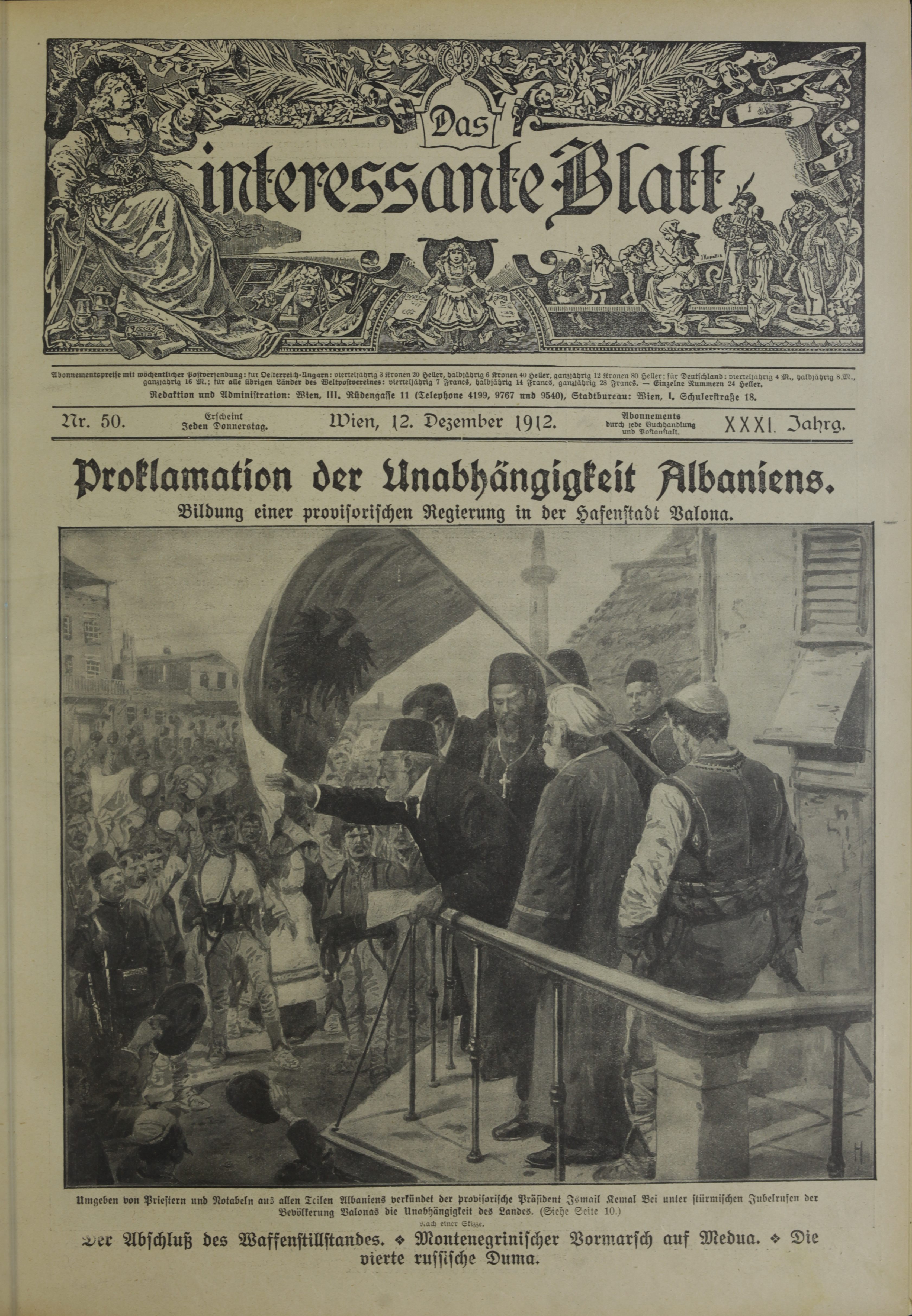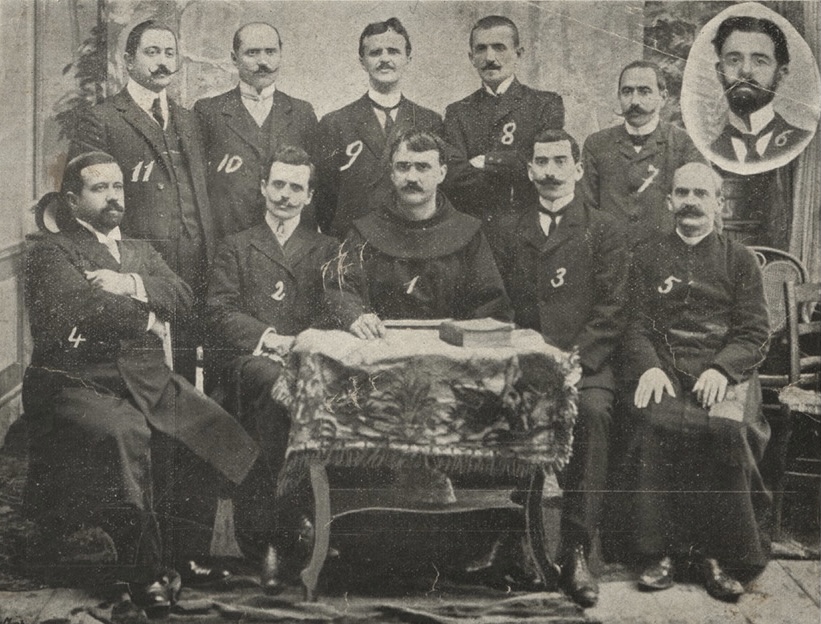|
Grigor Cilka
Grigor M. Cilka (1875-1919) was an Albanian Protestant reverend and missionary. In the height of the Albanian National Awakening he became a teacher at the first Albanian school for girls in Korçë. His wife Katerina was kidnapped during the Miss Stone Affair. Early life and education Grigor Cilka was born in 1875 in Vithkuq. The family later moved to Monastir. He was educated at missionary schools in Monastir, and later Samokov. Cilka was a convert from Orthodox Christianity to Protestant Christianity. He went to New York City, United States to finish his education at the Union Theological Seminary. Career During his stay in the US, Cilka in 1899 married Katerina Cilka, a Bulgarian nurse and Protestant from Bansko. In the summer following their marriage, they returned to Bulgaria, settled in Korçë and dedicated their efforts toward missionary work, teaching and humanitarian activities in surrounding villages. Cilka founded a Protestant parish in Korçë. After studying th ... [...More Info...] [...Related Items...] OR: [Wikipedia] [Google] [Baidu] |
Katerina Cilka
Katerina Cilka ( bg, Катерина Цилка; 1868 – 22 June 1952) was a Bulgarians, Bulgarian Protestant missionary from Bansko, abducted for ransom by a detachment of the pro-Bulgarian Inner Macedonian Revolutionary Organization (IMRO) in 1901 and released in 1902. Early life and education She was born as Katerina Dimitrova Stefanova ( bg, Катерина Димитрова Стефанова) in Protestants in Bulgaria, Bulgarian Protestant family in the Ottoman Empire's town of Bansko in 1868. Later she graduated from the American College of Sofia, American Board School at Samokov, Bulgaria. Cilka was a sister of the Sofia University Professor Constantine Stephanove. She moved to the United States to study at the Northfield Seminary and the Charity Nursing School of the Presbyterian Hospital (New York City). Cilka met in New York and married Grigor Cilka, an Albanian Protestant who studied at the United Theological Seminary. They returned to the Balkans and settled in ... [...More Info...] [...Related Items...] OR: [Wikipedia] [Google] [Baidu] |
Bansko
Bansko ( bg, Банско ) is a town in southwestern Bulgaria, located at the foot of the Pirin, Pirin Mountains at an elevation of 1200m AMSL, above sea level. It is a ski resort. Legends There are several legends about who founded Bansko. According to one, Bansko was founded by people who lived in Dobarsko, a village in Rila, itself, according to a legend, founded by the blinded army of Tsar Samuil of Bulgaria, Samuil. Another legend claims that Bansko was founded by an Italy, Italian painter by the name of Ciociolino, hence the existence of the name Chucholin in Bansko. Still according to another version it was a Slavic tribe called the Peruns, who lived in Pirin and worshiped Perun, that founded the village later to become a town. There are a number of ethnographic texts, legends, prayers and oratories, which lend credence to this legend. History Archeological traces of the inhabitants of Bansko and the Razlog Valley in general date to the early times of the Roman Empire. ... [...More Info...] [...Related Items...] OR: [Wikipedia] [Google] [Baidu] |
Spanish Flu
The 1918–1920 influenza pandemic, commonly known by the misnomer Spanish flu or as the Great Influenza epidemic, was an exceptionally deadly global influenza pandemic caused by the H1N1 influenza A virus. The earliest documented case was March 1918 in Kansas, United States, with further cases recorded in France, Germany and the United Kingdom in April. Two years later, nearly a third of the global population, or an estimated 500 million people, had been infected in four successive waves. Estimates of deaths range from 17 million to 50 million, and possibly as high as 100 million, making it one of the deadliest pandemics in history. The pandemic broke out near the end of World War I, when wartime censors suppressed bad news in the belligerent countries to maintain morale, but newspapers freely reported the outbreak in neutral Spain, creating a false impression of Spain as the epicenter and leading to the "Spanish flu" misnomer. Limited historical epidemiological ... [...More Info...] [...Related Items...] OR: [Wikipedia] [Google] [Baidu] |
Albanian Declaration Of Independence
The Albanian Declaration of Independence ( Albanian: ''Deklarata e Pavarësisë'') was the declaration of independence of Albania from the Ottoman Empire. Independent Albania was proclaimed in Vlorë on 28 November 1912. Six days later the Assembly of Vlorë formed the first Government of Albania which was led by Ismail Qemali and the Council of Elders (Pleqnia). The success of the Albanian Revolt of 1912 sent a strong signal to the neighboring countries that the Ottoman Empire was weak. The Kingdom of Serbia opposed the plan for an Albanian Vilayet, preferring a partition of the European territory of the Ottoman Empire among the four Balkan allies. Balkan allies planned the partition of the European territory of the Ottoman Empire among them and in the meantime the territory conquered during First Balkan War was agreed to have status of the Condominium. That was the reason for Ismail Qemali to organize an All-Albanian Congress in Vlorë. Independence Declaration The A ... [...More Info...] [...Related Items...] OR: [Wikipedia] [Google] [Baidu] |
Photios Of Korytsa
Photios Kalpidis ( el, Φώτιος Καλπίδης, 1862–1906) or Photios of Korytsa was the Greek Orthodox metropolitan bishop of Korçë, Ottoman Empire, from 1902 to 1906. He was assassinated in 1906 by irregular bands due to his pro-Greek activity. Photios was proclaimed an " ethnomartyr" by the Church of Greece. Life Photios was born in 1862 in the village of Cakrak, in Pontus region, Ottoman Empire. After finishing school he moved to Constantinople and attended the Halki seminary. He graduated in 1889 with honors. The following year he was ordained hierodeacon, while he also became director of the Greek school of Giresun. In 1897 Photios was appointed secretary of the Holy Synod of the Ecumenical Patriarchate. In 1902 Photios was appointed metropolitan bishop of Korytsa and Premeti, centered in Korçe (), modern southeast Albania (then part of the Ottoman Empire). In general, Photios showed great interest in the promotion of the thriving Greek educational system among ... [...More Info...] [...Related Items...] OR: [Wikipedia] [Google] [Baidu] |
Latin Script
The Latin script, also known as Roman script, is an alphabetic writing system based on the letters of the classical Latin alphabet, derived from a form of the Greek alphabet which was in use in the ancient Greek city of Cumae, in southern Italy ( Magna Grecia). It was adopted by the Etruscans and subsequently by the Romans. Several Latin-script alphabets exist, which differ in graphemes, collation and phonetic values from the classical Latin alphabet. The Latin script is the basis of the International Phonetic Alphabet, and the 26 most widespread letters are the letters contained in the ISO basic Latin alphabet. Latin script is the basis for the largest number of alphabets of any writing system and is the most widely adopted writing system in the world. Latin script is used as the standard method of writing for most Western and Central, and some Eastern, European languages as well as many languages in other parts of the world. Name The script is either called Latin script ... [...More Info...] [...Related Items...] OR: [Wikipedia] [Google] [Baidu] |
Academic Conference
An academic conference or scientific conference (also congress, symposium, workshop, or meeting) is an event for researchers (not necessarily academics) to present and discuss their scholarly work. Together with academic or scientific journals and Preprint archives such as arXiv, conferences provide an important channel for exchange of information between researchers. Further benefits of participating in academic conferences include learning effects in terms of presentation skills and “academic habitus”, receiving feedback from peers for one’s own research, the possibility to engage in informal communication with peers about work opportunities and collaborations, and getting an overview of current research in one or more disciplines. Overview Conferences usually encompass various presentations. They tend to be short and concise, with a time span of about 10 to 30 minutes; presentations are usually followed by a . The work may be bundled in written form as academic pape ... [...More Info...] [...Related Items...] OR: [Wikipedia] [Google] [Baidu] |
Congress Of Manastir
The Congress of Manastir ( sq, Kongresi i Manastirit) was an academic conference held in the city of Manastir (now Bitola) from November 14 to 22, 1908, with the goal of standardizing the Albanian alphabet. November 22 is now a commemorative day in Albania, Kosovo and North Macedonia, as well as among the Albanian diaspora, known as Alphabet Day ( sq, Dita e Alfabetit). Prior to the Congress, the Albanian language was represented by a combination of six or more distinct alphabets, plus a number of sub-variants. Participants The congress was held by the Union Association (Albanian language: Bashkimi) literary society at the house of Fehim Zavalani, which served as the headquarters of the union. The participants of the congress were prominent figures of the cultural and political life from Albanian-inhabited territories in the Balkans, as well as throughout the Albanian diaspora. There were fifty delegates, representing twenty-three Albanian-inhabited cities, towns, and cultural ... [...More Info...] [...Related Items...] OR: [Wikipedia] [Google] [Baidu] |
Austro-Hungarian
Austria-Hungary, often referred to as the Austro-Hungarian Empire,, the Dual Monarchy, or Austria, was a constitutional monarchy and great power in Central Europe between 1867 and 1918. It was formed with the Austro-Hungarian Compromise of 1867 in the aftermath of the Austro-Prussian War and was dissolved shortly after its defeat in the First World War. Austria-Hungary was ruled by the House of Habsburg and constituted the last phase in the constitutional evolution of the Habsburg monarchy. It was a multinational state and one of Europe's major powers at the time. Austria-Hungary was geographically the second-largest country in Europe after the Russian Empire, at and the third-most populous (after Russia and the German Empire). The Empire built up the fourth-largest machine building industry in the world, after the United States, Germany and the United Kingdom. Austria-Hungary also became the world's third-largest manufacturer and exporter of electric home appliances, el ... [...More Info...] [...Related Items...] OR: [Wikipedia] [Google] [Baidu] |
Ilinden Uprising
Ilinden (Bulgarian/ Macedonian Cyrillic: Илинден) or Ilindan ( Serbian Cyrillic: Илиндан), meaning "Saint Elijah's Day", may refer to: Events * Republic Day (North Macedonia), 2 August Geographic locations Bulgaria * Ilinden, Blagoevgrad Province, a village * Ilinden, Sofia, an urban municipality North Macedonia * Ilinden Municipality * Ilinden (village) Association football clubs * FK Ilinden 1955 Bašino * FK Ilinden Skopje * Rockdale Ilinden FC Other meanings * ''Ilinden'' (memorial), a sculpture in Kruševo, North Macedonia * ''Ilinden'' (novel), by Dimitar Talev * Ilinden (organization) Ilinden was a veteran unpolitical organization established in Sofia in 1921 with branches in a whole of Bulgaria.''Historical Dictionary of the Republic of Macedonia'', Dimitar Bechev, Scarecrow Press, 2009, , p. 94. It was founded by leaders of ..., a Bulgarian revolutionary organization 1921–1947 * ''Ilinden'', a boat built in 1924 which sank in the 2009 Lake Ohrid b ... [...More Info...] [...Related Items...] OR: [Wikipedia] [Google] [Baidu] |
Salonika
Thessaloniki (; el, Θεσσαλονίκη, , also known as Thessalonica (), Saloniki, or Salonica (), is the second-largest city in Greece, with over one million inhabitants in its metropolitan area, and the capital of the geographic region of Macedonia, the administrative region of Central Macedonia and the Decentralized Administration of Macedonia and Thrace. It is also known in Greek as (), literally "the co-capital", a reference to its historical status as the () or "co-reigning" city of the Byzantine Empire alongside Constantinople. Thessaloniki is located on the Thermaic Gulf, at the northwest corner of the Aegean Sea. It is bounded on the west by the delta of the Axios. The municipality of Thessaloniki, the historical center, had a population of 317,778 in 2021, while the Thessaloniki metropolitan area had 1,091,424 inhabitants in 2021. It is Greece's second major economic, industrial, commercial and political centre, and a major transportation hub for Greece and south ... [...More Info...] [...Related Items...] OR: [Wikipedia] [Google] [Baidu] |
Wāli
''Wāli'', ''Wā'lī'' or ''vali'' (from ar, والي ''Wālī'') is an administrative title that was used in the Muslim World (including the Caliphate and Ottoman Empire) to designate governors of administrative divisions. It is still in use in some countries influenced by Arab or Muslim culture. The division that a ''Wāli'' governs is called ''Wilayah'', or in the case of Ottoman Turkey, "''Vilayet''". The title currently also refers to the ceremonial head of the Bangsamoro, a Muslim-majority autonomous region of the Philippines. Algerian term In Algeria, a ''wāli'' is the "governor" and administrative head of each of the 58 provinces of the country, and is chosen by the president. Iranian term In Iran the term is known as Vāli and refers to the governor-general or local lord of an important province. During the Safavid reign 1501-1722 the former rulers of the then subordinated provinces of the Georgian Kartli and Kakheti kingdom, the Kurdish emirate of Ardalan, ... [...More Info...] [...Related Items...] OR: [Wikipedia] [Google] [Baidu] |






